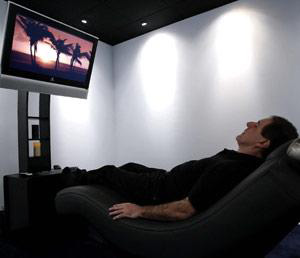 |
 |
 |
 Health & Beauty | February 2007 Health & Beauty | February 2007  
Taking a Nice Nap Could Save Your Life
 Robert S. Boyd - McClatchy News Robert S. Boyd - McClatchy News


| | Engineer Mark Ekenbarger stretches out in the nap room at Yarde Metals, Inc.'s headquarters in Southington, Conn. Ekenbarger, who has a heart condition, says he frequently takes half-hour naps on the advice of his doctor to reduce stress. (Bob Child - AP) |
At last, science has come up with proof that naps are good for you. Tell your boss! Tell your spouse!

People who take at least three daytime naps a week lasting 30 minutes or longer cut their risk of dying from a heart attack by 37 percent, according to a new study by a team of American and Greek researchers.

Regular siestas apparently lower stress, which is frequently associated with heart disease, the scientists report in Monday's edition of the medical journal Archives of Internal Medicine.

"If you can take a midday nap, do so," advised co-author Dimitrios Trichopoulos, an epidemiologist at the Harvard School of Public Health in Boston.

Trichopoulos and a colleague, Androniki Naska of the Athens Medical School, followed 23,681 originally healthy men and women in Greece for more than six years. Of these, 792 died, 133 of them from heart disease.

Slightly more than half the study group (13,400) took regular midday naps -- a mark of siestas' popularity in Mediterranean societies. The nappers' death rate was about two-thirds the rate among Greeks who stayed awake all day, the study found.

The reasons for napping's life-saving merits aren't definitely known, but a number of studies have found links between heart troubles and physical or emotional stress.

"There is considerable evidence that both acute and chronic stress are related to heart disease," Trichopoulos said. "An afternoon siesta in a healthy individual may act as a stress-releasing process [and] reduce coronary mortality."

"The study makes sense," said Peter Vitaliano, a professor of psychiatry and psychology at the University of Washington in Seattle, who wasn't involved in the project. "Napping provides an opportunity to recover from stress."

Stress shows up in a person's blood pressure, heart rate, hormones, sugar and cholesterol levels, Vitaliano said. People who recover quickly from stress are better off than those whose stress levels remain high all day.

Vitaliano cautioned that the results might have been different if the study had been conducted in the United States, where daytime naps are often frowned upon.

"There is a huge difference in how napping is accepted in Mediterranean countries - like Greece, Italy and Spain - versus the cutthroat, boiler-room pressure to be competitive in the United States," he said.

"Here, if a person naps, people say, 'You lazy slob.' There they say, 'Did you have a good nap?' So there's going to be a difference how much naps help."

The study covered 9,569 men and 14,112 women aged 20 to 86. Slightly more than half (13,186) were working when the study began. The rest were unemployed or retired. | 
 | |
 |



